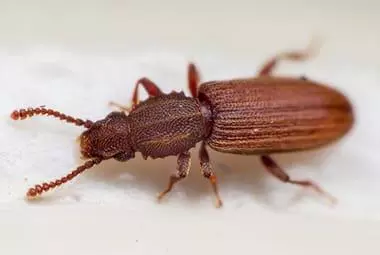With fall arriving and colder weather with it, we don’t anticipate finding insects in our homes anymore, especially beetles in our cereal! Summer is the season for insects, and many people believe that the chill of winter eliminates most insect problems. However, this simply isn’t true. Pantry pests, like the saw-toothed grain beetle, commonly invade homes in fall and winter.
What are saw-toothed grain beetles?
No one wants to find insects in their pantry items, but if you do find bugs in your cereal, understanding how to identify what pest infestation you’re dealing with is important. Saw-toothed grain beetles are small brown beetles with long flattened bodies that get narrower at the tip. These small insects are pantry pests and get their name from the six saw-like protrusions on either side of their thorax.
How do saw-toothed grain beetles invade?
Saw-toothed grain beetles are most often found in stored-food products such as cereal, pasta, flour, nuts, baking mix, bread, sugar, and a wide range of other dried goods. Most infestations begin in grocery stores or food-processing facilities. If you find saw-toothed grain beetles in your home, it’s almost always because you bought an infested food item at the store by mistake. While it is more common to encounter adult saw-toothed grain beetles in your home, it is actually the larva that does most of the damage. Saw-toothed grain beetles don’t bite or cause harm in any physical way. Instead, these insects cause problems by contaminating food items with their bodies, eggs, and larvae.
Pantry Pest Prevention Tips
There are many prevention tips you can try that will reduce your risk for an infestation, but prevention tips will never be as effective as professional pest control. To keep saw-toothed grain beetles and other pantry pests out of your home this fall, follow these helpful pantry pest prevention tips from the National Pest Management Association (NPMA):
- Inspect dried goods before purchasing. If a bag or box has small holes, it could mean that saw-toothed grain beetles have already gotten inside.
- Inspect the interior bagged food items themselves once you arrive home. If there are signs of larva or eggs inside, throw the infested product away.
- Store pasta, flour, and other dry foods in hard plastic or glass containers that can’t be chewed through.
- Only purchase items that show no sign of damage.
- Check expiration dates on baking ingredients before use.
- Keep kitchen counters, floors, and sinks clean because crumbs and spills quickly attract pests.
- Dispose of garbage regularly in sealed receptacles.
- Seal cracks or holes around the stovepipes and water pipes.
- Eliminate all moisture sites, including leaking pipes and clogged drains.
If an infestation has already occurred, you shouldn’t try to handle it alone. Pantry pest problems can get out of hand quickly if they aren’t dealt with right away. It is recommended to contact a pest professional if a pantry pest infestation is suspected.

